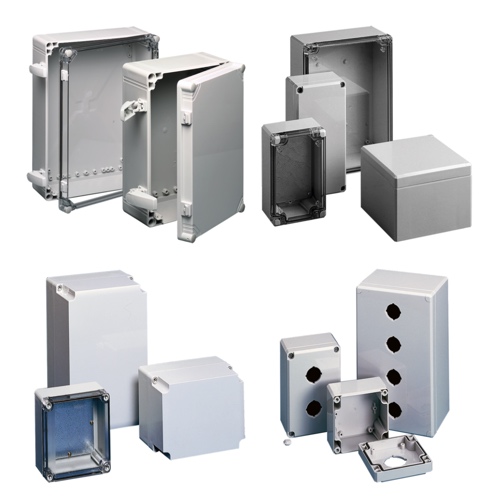nVent Hoffman Polycarbonate Enclosures

Polycarbonate enclosures are made of a thermoplastic resin processed by sheet extrusion or injection molding. Polycarbonate is resistant to corrosion and some acidic environments, however, it is sensitive to abrasive cleaners and should not be around organic solvents and alkalis environments. Polycarbonate is impact resistant and has a temperature range of -31 degrees Fahrenheit to 180 degrees Fahrenheit.
nVent Hoffman QLINE Polycarbonate wall mount enclosures have molded, impact-resistant bodies with opaque or clear covers. Polycarbonate material is easily drilled, punched, filed or sawed. The enclosures have molded internal pads for mounting optional rails, panels and other components.
QLINE I enclosures are the largest-sized QLINE enclosures and provide easy access and protects larger controls from corrosive environments. Choose from screw cover, hinge, internal mounting, variable depth and quick-release latch options. QLINE D enclosures have contoured bodies with flush cover screws, are functional in corrosive environments and can withstand occasional submersion. QLINE E enclosures house larger controls, provide additional size options and offer greater internal mounting flexibility than smaller QLINE products. Featuring contoured bodies with flush cover screws, they are functional in corrosive environments and can withstand occasional submersion.
More Information about nVent Hoffman Non-Metallic Enclosures
nVent Hoffman non-metallic enclosures are available in a wide selection of sizes and configurations. You can find them as junction boxes, wall-mount enclosures, and free-standing enclosures. And you get mounting options and accessories that make these enclosures usable. nVent Hoffman provides an array of ways to mount your equipment inside the enclosure. You can also buy back panels, hinged covers, and padlocking provisions to keep things secure. These conveniently available accessories make configuring and using the box a snap. In this feature-rich environment, you can put just about anything you need to house into a nVent Hoffman non-metallic enclosure.
Non-Metallic Enclosure Types
Characteristics of non-metallic enclosures:
NEMA 4x rating for outdoor use providing chemical resistance and protection from dust, debris, water and rain.
High insulation value, which provides insulation from cold and hot temperatures, but does not dissipate heat from inside the enclosure.
Non-conductive, meaning components cannot be grounded to the enclosure, but it still provides the same security and tamper resistance levels as metallic enclosures when properly locked.
Types of non-metallic enclosures:
Fiberglass
A thermoset polyester material reinforced with glass fibers. It is the most widely used non-metallic material in the industry. It has high impact strength and rigidity (dimensional stability), a superior working temperature range (-31˚F to 300˚F), excellent electrical properties, moisture and chemical resistance, as well as being cost effective.
Polycarbonate
High-performance thermoplastic resin processed by injection molding or sheet extrusion. It is impact resistant, rigid (dimensional stability), has an extended temperature range (-31˚F to 180˚F), excellent electrical properties, fire retention, UV stability and corrosion resistance in some acidic surroundings. It is not suitable for environments with strong alkalis and organic solvents.
ABS or ABS blends
Acrylonitrile Butadiene Styrene is a common thermoplastic polymer processed by injection molding. It has high impact resistance, but less impact resistance in cold weather compared to polycarbonate, excellent electrical properties, superior chemical and moisture resistance, but a narrower temperature range than fiberglass (-40˚F to 248˚F).
Polyester
High-performance unfilled thermal plastic processed by injection molding. It has high impact resistance, but less impact resistance in cold weather than polycarbonate, excellent electrical properties, superior chemical and corrosion resistance, but a narrower temperature range than fiberglass (-40˚F to 248˚F).

